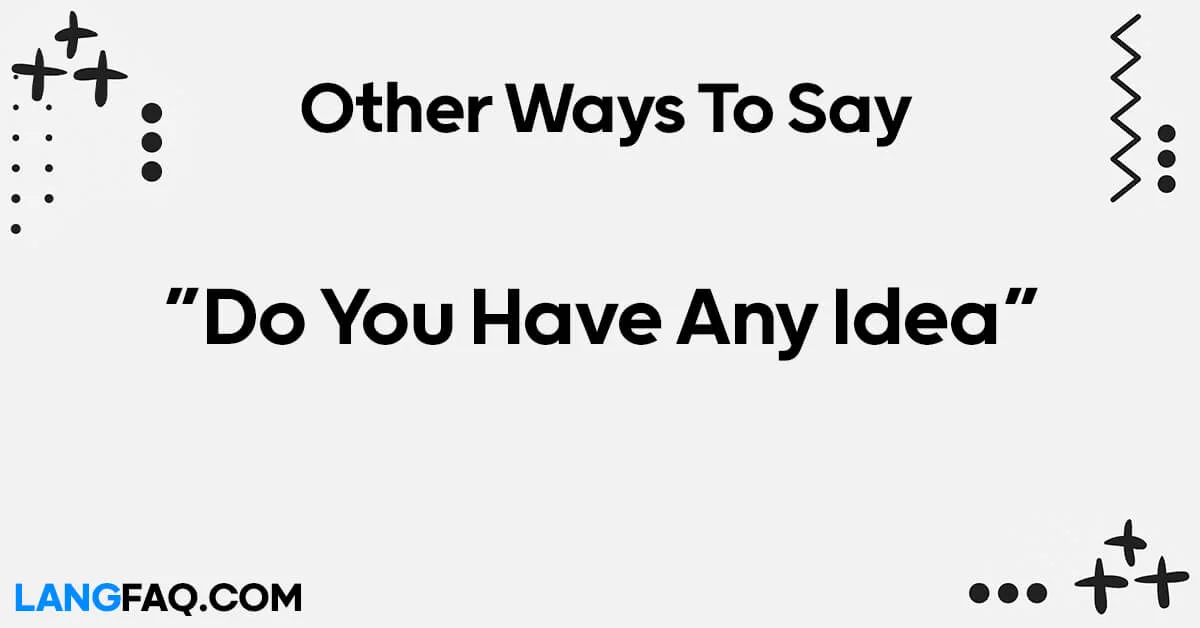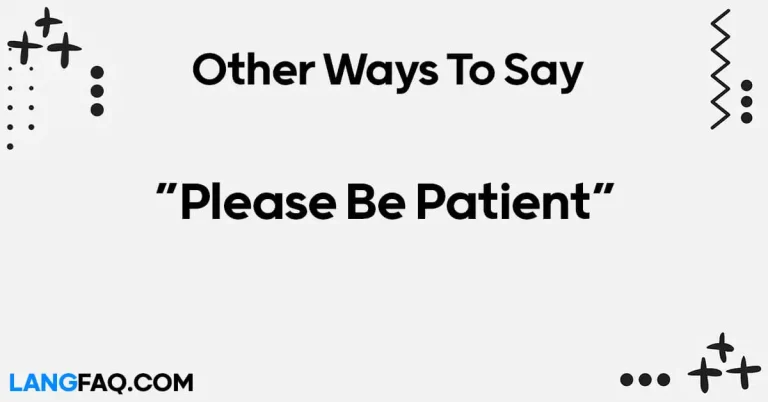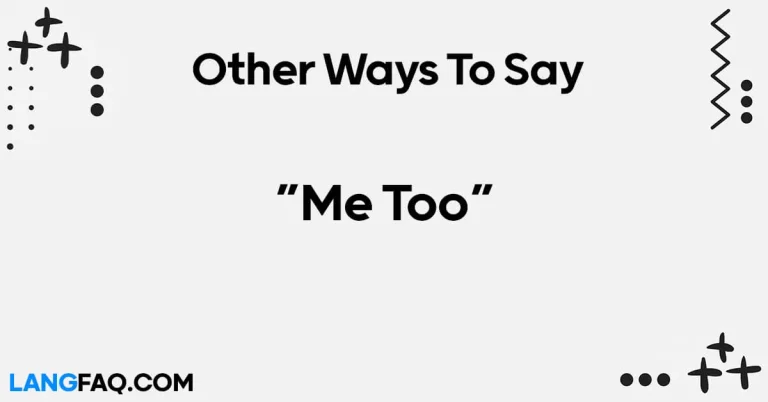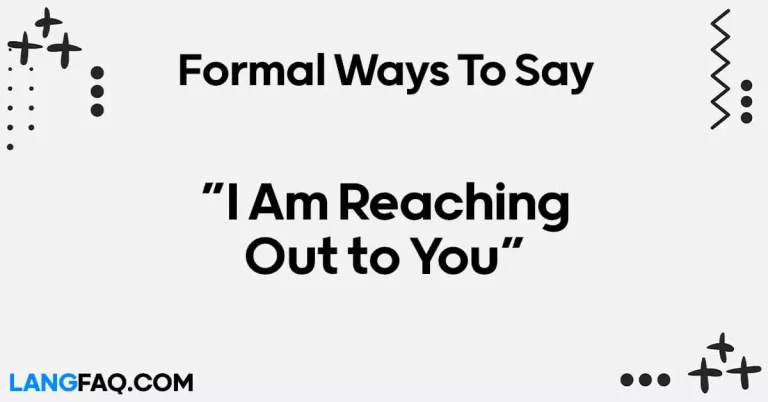Expanding your vocabulary not only enhances communication skills but also adds flair to your expressions. In this article, we delve into alternative phrases for “Do You Have Any Idea.” From colloquial to sophisticated, these alternatives cater to various contexts, empowering you with versatile language tools.
12 Other Ways to Say “Do You Have Any Idea”
Here are 12 alternative phrases for “Do You Have Any Idea”:
- Are you aware of
- Have you considered
- Do you know anything about
- Can you shed some light on
- Have you thought about
- Are you familiar with
- Any insights on
- Have you got a clue about
- Do you grasp the concept of
- Any thoughts on
- Are you knowledgeable about
- Can you enlighten me on
| Phrase | Meaning | Example |
|---|---|---|
| Are you aware of…? | Inquiring if someone possesses knowledge or information about a particular topic or situation. | Are you aware of the new company policy changes? |
| Have you considered…? | Asking if someone has thought about or taken into account a certain idea or possibility. | Have you considered the potential risks involved? |
| Do you know anything about…? | Seeking information or understanding regarding a specific subject. | Do you know anything about the upcoming event? |
| Can you shed some light on…? | Requesting clarification or explanation on a matter to gain understanding. | Can you shed some light on how this machine works? |
| Have you thought about…? | Asking if someone has given any consideration to a particular matter. | Have you thought about the implications of your decision? |
| Are you familiar with…? | Inquiring if someone has knowledge or experience with a certain topic or concept. | Are you familiar with the latest advancements in technology? |
| Any insights on…? | Seeking opinions, perspectives, or information regarding a specific subject. | Any insights on how to improve our marketing strategy? |
| Have you got a clue about…? | Asking if someone has any understanding or information about a particular topic. | Have you got a clue about what’s causing the issue? |
| Do you grasp the concept of…? | Inquiring if someone understands or comprehends a certain idea or concept. | Do you grasp the concept of quantum mechanics? |
| Any thoughts on…? | Requesting opinions, ideas, or perspectives on a given subject. | Any thoughts on how to tackle this problem? |
| Are you knowledgeable about…? | Asking if someone has expertise or understanding in a specific area. | Are you knowledgeable about classical literature? |
| Can you enlighten me on…? | Requesting further explanation or clarification on a topic to gain insight. | Can you enlighten me on the current economic situation? |
This table presents a variety of alternative phrases to “Do You Have Any Idea,” allowing for more diverse and nuanced communication. Whether seeking information, opinions, or understanding, these expressions offer flexibility in conversation and inquiry.
Is It Correct to Say “Do You Have Any Idea”?
Yes, “Do you have any idea?” is a grammatically correct phrase in English.
It is commonly used to inquire whether someone has any knowledge or understanding of a particular topic, situation, or problem.
The phrase is often used in both formal and informal contexts to solicit information or opinions from others.
Professional Mail Example With “Do You Have Any Idea”
Subject: Seeking Input on Marketing Strategy
Dear [Recipient’s Name],
I hope this email finds you well. I am reaching out to you as we are currently brainstorming ideas for our upcoming marketing campaign, and I would greatly appreciate your insights.
Given your expertise in the industry, do you have any idea how we can enhance our brand visibility and engagement with our target audience? Your input would be invaluable as we strive to create an impactful marketing strategy.
Please feel free to share any thoughts or suggestions you may have. Your contribution will play a crucial role in shaping the success of our campaign.
Thank you in advance for your time and assistance.
Best regards, [Your Name]
Are you aware of
In our quest for effective communication, one phrase stands out as a versatile tool: “Are you aware of…?” This expression serves as a gentle inquiry into someone’s knowledge or understanding of a particular topic or situation. It can be employed in both formal and informal settings, making it suitable for various contexts.
Scenario: In a professional setting, you might use “Are you aware of…?” to ensure everyone is informed about an upcoming project deadline or policy change. Conversely, in a casual conversation with friends, you could employ it to gauge their knowledge of a recent news event or trending topic.
Example: Colleague 1: “Are you aware of the meeting scheduled for tomorrow morning?” Colleague 2: “Yes, I have it marked on my calendar.”
Variations:
- “Do you know about…?”
- “Are you informed about…?”
- “Have you heard about…?”
Dictionary Insights: According to Cambridge Dictionary, “aware” means having knowledge or perception of a situation or fact.
When to Use: Use “Are you aware of…?” when you want to politely inquire about someone’s knowledge or awareness of a specific matter.
Pros:
- Polite and respectful tone.
- Suitable for both formal and informal situations.
- Encourages open communication.
Cons:
- Can come across as patronizing if overused or misused.
- May not be suitable for extremely casual situations.
Grammar/Usage Rules: Ensure subject-verb agreement when using this phrase. For example, “Are you aware” for singular subjects and “Are you all aware” for plural subjects.
Tips:
- Use this phrase to gently introduce new information or topics of discussion.
- Pay attention to the tone and context to ensure appropriateness.
Example Email:
Subject: Reminder: Meeting Tomorrow Morning
Hi Team,
Just a quick reminder that we have a meeting scheduled for tomorrow morning at 9:00 AM in the conference room. Are you all aware of this? Please make sure to review the agenda beforehand.
Looking forward to productive discussions,
[Your Name]
Have you considered
When navigating conversations, the phrase “Have you considered…?” serves as a powerful tool for prompting deeper thought and exploration of ideas. This versatile expression can be utilized in various contexts, from brainstorming sessions to personal discussions, fostering creativity and critical thinking.
Scenario: In a brainstorming meeting, you might use “Have you considered…?” to encourage team members to explore alternative solutions or approaches to a problem. Similarly, in a one-on-one conversation, you could employ it to gently challenge someone’s perspective and broaden their thinking.
Example: Friend 1: “I’m not sure what to do for my birthday this year.” Friend 2: “Have you considered having a small gathering at your favorite restaurant?”
Variations:
- “Did you think about…?”
- “Has it crossed your mind to…?”
- “Would you be open to exploring…?”
Dictionary Insights: According to Merriam-Webster, “consider” means to think about carefully, especially in order to make a decision or form an opinion.
When to Use: Use “Have you considered…?” when you want to encourage someone to think about alternative options or perspectives.
Pros:
- Encourages open-mindedness and creativity.
- Promotes thoughtful decision-making.
- Allows for exploration of different possibilities.
Cons:
- May be perceived as intrusive if used insensitively.
- Requires sensitivity to the recipient’s receptiveness to feedback or suggestions.
Grammar/Usage Rules: Ensure clarity and specificity in your suggestions when using this phrase to avoid confusion or misunderstandings.
Tips:
- Frame your suggestion as a genuine inquiry rather than a directive.
- Be prepared to listen actively and respectfully to the recipient’s response.
Example Email:
Subject: Ideas for Our Team Retreat
Hi Team,
As we begin planning our upcoming team retreat, I wanted to encourage everyone to think outside the box and consider unique activities or locations. Have you considered incorporating team-building exercises into the agenda? I believe it could enhance our bonding experience and foster a sense of camaraderie.
Looking forward to hearing your thoughts,
[Your Name]
Do you know anything about
The phrase “Do you know anything about…?” serves as a straightforward inquiry into someone’s knowledge or familiarity with a particular subject. It can be used in both formal and informal contexts, making it a versatile tool for initiating conversations and gathering information.
Scenario: In a professional setting, you might use “Do you know anything about…?” to ascertain a colleague’s expertise on a specific project or topic. Conversely, in a social gathering, you could employ it to spark discussions about shared interests or current events.
Example: Colleague 1: “Do you know anything about the new software update?” Colleague 2: “Yes, I’ve been researching it for our upcoming project.”
Variations:
- “Are you familiar with…?”
- “Have you heard anything about…?”
- “Can you tell me about…?”
Dictionary Insights: According to Oxford Languages, “know” refers to being aware of information or facts through observation, inquiry, or experience.
When to Use: Use “Do you know anything about…?” when seeking information or confirmation of someone’s knowledge on a specific topic.
Pros:
- Direct and to the point.
- Suitable for various communication settings.
- Allows for straightforward information gathering.
Cons:
- May come across as abrupt if not used in appropriate contexts.
- Requires clarity and specificity to avoid ambiguity.
Grammar/Usage Rules: Ensure clarity in your question to facilitate a clear and concise response from the recipient.
Tips:
- Frame your question in a polite and respectful manner to encourage openness and engagement.
- Be prepared to provide context or additional information if necessary.
Example Email:
Subject: Inquiry about Project Status
Hi [Colleague’s Name],
I hope this email finds you well. I wanted to touch base regarding the latest updates on the project. Do you know anything about the current status or any recent developments? Your insights would be greatly appreciated as we move forward with our plans.
Looking forward to hearing from you soon,
[Your Name]
Can you shed some light on
The phrase “Can you shed some light on…?” serves as an invitation for someone to provide clarity or insight into a particular topic or situation. It conveys a sense of openness and curiosity, making it a valuable tool for fostering communication and understanding.
Scenario: In a professional setting, you might use “Can you shed some light on…?” to request additional information or context from a colleague or supervisor. Similarly, in a personal conversation, you could employ it to seek clarification or guidance on a challenging issue.
Example: Friend 1: “I’m not sure how to approach this problem at work.” Friend 2: “Can you shed some light on the specific challenges you’re facing?”
Variations:
- “Could you provide some insight into…?”
- “Would you mind explaining…?”
- “Do you have any information about…?”
Dictionary Insights: According to Collins Dictionary, “shed light on” means to clarify or explain a situation, making it easier to understand.
When to Use: Use “Can you shed some light on…?” when seeking clarification or additional information on a specific topic or issue.
Pros:
- Invites open communication and dialogue.
- Demonstrates humility and a willingness to learn.
- Encourages collaboration and problem-solving.
Cons:
- May be perceived as a request for extensive explanation, requiring sensitivity to the recipient’s time and availability.
- Requires clarity and specificity to ensure the desired information is provided.
Grammar/Usage Rules: Ensure your question is framed in a clear and concise manner to facilitate a focused response.
Tips:
- Provide context or background information to help the recipient understand the purpose of your inquiry.
- Express gratitude for any insights or information shared in response to your question.
Example Email:
Subject: Seeking Clarification on Project Requirements
Hi [Supervisor’s Name],
I hope you’re doing well. I’m reaching out to seek some clarification on the project requirements for the upcoming deadline. Can you shed some light on the specific deliverables and expectations? Your guidance would be greatly appreciated as I finalize my plans.
Thank you in advance for your assistance.
Best regards, [Your Name]
Have you thought about
The phrase “Have you thought about…?” serves as a prompt for someone to consider or explore alternative perspectives or solutions. It encourages reflection and introspection, making it a valuable tool for problem-solving and decision-making.
Scenario: In a professional setting, you might use “Have you thought about…?” to prompt a colleague to consider potential challenges or opportunities in a project. Similarly, in a personal conversation, you could employ it to encourage a friend to explore different options or approaches to a problem.
Example: Colleague 1: “I’m not sure how to approach this presentation.” Colleague 2: “Have you thought about incorporating visuals to enhance your message?”
Variations:
- “Did you consider…?”
- “Has it crossed your mind to…?”
- “Would you be open to exploring…?”
Dictionary Insights: According to Merriam-Webster, “thought” refers to the action or process of thinking or considering something.
When to Use: Use “Have you thought about…?” when encouraging someone to consider alternative perspectives or solutions.
Pros:
- Encourages open-mindedness and creativity.
- Promotes critical thinking and problem-solving skills.
- Facilitates exploration of different options or approaches.
Cons:
- May be perceived as intrusive if not used sensitively.
- Requires sensitivity to the recipient’s receptiveness to feedback or suggestions.
Grammar/Usage Rules: Ensure your question is framed in a respectful and non-judgmental manner to foster a positive response.
Tips:
- Frame your question as a genuine inquiry rather than a directive.
- Be prepared to listen actively and respectfully to the recipient’s response.
Example Email:
Subject: Exploring New Approaches for Project Implementation
Hi Team,
As we continue to brainstorm ideas for the upcoming project, I wanted to encourage everyone to think outside the box and consider innovative approaches. Have you thought about incorporating gamification elements to enhance user engagement? I believe it could add a unique dimension to our deliverables.
Looking forward to hearing your thoughts and ideas.
Best regards, [Your Name]
Are you familiar with
The phrase “Are you familiar with…?” serves as a polite inquiry into someone’s knowledge or experience with a particular topic or concept. It allows for a respectful exchange of information and facilitates effective communication.
Scenario: In a professional setting, you might use “Are you familiar with…?” to gauge a colleague’s understanding of a new software program or industry trend. Conversely, in a social setting, you could employ it to initiate a discussion about a shared interest or hobby.
Example: Friend 1: “I’ve been learning to play the guitar.” Friend 2: “Are you familiar with any basic chords?”
Variations:
- “Do you know about…?”
- “Have you heard of…?”
- “Can you tell me about…?”
Dictionary Insights: According to Oxford Languages, “familiar” means having knowledge or experience with something.
When to Use: Use “Are you familiar with…?” when seeking information or confirmation of someone’s knowledge or experience on a specific topic.
Pros:
- Polite and respectful tone.
- Suitable for various communication settings.
- Allows for mutual exchange of information and experiences.
Cons:
- May be perceived as redundant if used excessively.
- Requires clarity and specificity to avoid ambiguity.
Grammar/Usage Rules: Ensure your question is framed in a clear and concise manner to facilitate a focused response.
Tips:
- Use this phrase to initiate conversations and build rapport with others.
- Be prepared to provide additional information or context as needed.
Example Email:
Subject: Seeking Information on New Software Program
Hi [Colleague’s Name],
I hope you’re doing well. I wanted to reach out to see if you’re familiar with the new software program we’ll be using for the upcoming project. Are you familiar with its features and functionalities? Any insights you could provide would be greatly appreciated as we familiarize ourselves with the platform.
Thank you in advance for your assistance.
Best regards, [Your Name]
Any insights on
The phrase “Any insights on…?” serves as an invitation for someone to share their opinions, perspectives, or information on a particular subject. It fosters open communication and collaboration, making it a valuable tool for gathering insights and fostering mutual understanding.
Scenario: In a professional setting, you might use “Any insights on…?” to prompt a colleague to share their expertise or observations on a project or industry trend. Similarly, in a social setting, you could employ it to engage friends in a discussion about a thought-provoking topic or current event.
Example: Colleague 1: “We’re exploring new marketing strategies.” Colleague 2: “Any insights on how we can improve our online presence?”
Variations:
- “Can you share your thoughts on…?”
- “Do you have any perspectives on…?”
- “Would you like to offer input on…?”
Dictionary Insights: According to Lexico, “insight” refers to the capacity to gain an accurate and deep understanding of someone or something.
When to Use: Use “Any insights on…?” when seeking opinions, perspectives, or information from others on a specific topic.
Pros:
- Encourages collaboration and dialogue.
- Facilitates knowledge sharing and mutual learning.
- Promotes a culture of openness and inclusivity.
Cons:
- May be perceived as overly broad or vague if not used in conjunction with specific topics or questions.
- Requires active listening and engagement to ensure meaningful contributions from participants.
Grammar/Usage Rules: Ensure your question is framed in a clear and concise manner to facilitate focused responses.
Tips:
- Use this phrase to initiate discussions and brainstorming sessions with colleagues or peers.
- Encourage participants to share their diverse perspectives and experiences.
Example Email:
Subject: Seeking Input on Project Strategy
Hi Team,
As we continue to refine our strategy for the upcoming project, I wanted to reach out to gather input from each of you. Any insights on how we can streamline our processes and enhance collaboration? Your contributions will be invaluable as we work towards our common goals.
Looking forward to hearing your thoughts and ideas.
Best regards, [Your Name]
Have you got a clue about
The phrase “Have you got a clue about…?” serves as a casual and informal inquiry into someone’s understanding or knowledge of a particular topic. It can be used in various settings, from friendly conversations to playful banter, adding a light-hearted tone to interactions.
Scenario: In a casual conversation, you might use “Have you got a clue about…?” to playfully tease a friend about their knowledge of a trivial or obscure topic. Similarly, in a social gathering, you could employ it to engage others in a guessing game or trivia quiz.
Example: Friend 1: “I can’t remember the name of that actor.” Friend 2: “Have you got a clue about which movie he starred in?”
Variations:
- “Do you have any idea about…?”
- “Can you guess…?”
- “Would you happen to know…?”
Dictionary Insights: According to Cambridge Dictionary, “clue” refers to a piece of information or a fact that helps you understand something.
When to Use: Use “Have you got a clue about…?” in informal settings to playfully inquire about someone’s knowledge or understanding of a topic.
Pros:
- Adds a playful and informal tone to conversations.
- Encourages engagement and participation in discussions.
- Creates opportunities for lighthearted banter and humor.
Cons:
- May not be suitable for formal or professional settings.
- Can be perceived as flippant or dismissive if used inappropriately.
Grammar/Usage Rules: Ensure your tone is friendly and non-threatening when using this phrase to avoid causing offense.
Tips:
- Use this phrase sparingly and in appropriate contexts to maintain the mood and atmosphere of the conversation.
- Be prepared to provide hints or clues if necessary to keep the interaction light and enjoyable.
Example Email:
Subject: Trivia Night at the Bar
Hey Everyone,
Just a quick reminder that we’re hosting a trivia night at the bar this Friday! Have you got a clue about which team will come out on top? It’s sure to be a fun and competitive evening, so gather your friends and join us for a night of laughter and friendly competition.
Looking forward to seeing you there!
Cheers, [Your Name]
Do you grasp the concept of
The phrase “Do you grasp the concept of…?” serves as a direct inquiry into someone’s understanding or comprehension of a particular idea or concept. It can be used to assess someone’s level of understanding and to clarify any areas of confusion.
Scenario: In an educational setting, a teacher might use “Do you grasp the concept of…?” to check if students understand a complex topic before moving on to the next lesson. Similarly, in a professional environment, a supervisor might employ it to ensure that team members have a clear understanding of a new procedure or protocol.
Example: Teacher: “Do you grasp the concept of quadratic equations?” Student: “Yes, I understand how to solve them using the quadratic formula.”
Variations:
- “Have you understood the idea of…?”
- “Can you explain your understanding of…?”
- “Are you clear on the concept of…?”
Dictionary Insights: According to Merriam-Webster, “grasp” means to understand or perceive the meaning of something.
When to Use: Use “Do you grasp the concept of…?” when you want to ascertain someone’s understanding or comprehension of a specific idea or concept.
Pros:
- Direct and to the point, facilitating clear communication.
- Helps identify areas of confusion or misunderstanding.
- Encourages active engagement and participation in learning or discussion.
Cons:
- May be perceived as overly formal or confrontational if not used appropriately.
- Requires sensitivity to the recipient’s receptiveness to feedback or clarification.
Grammar/Usage Rules: Ensure your question is framed in a neutral and non-threatening manner to encourage open communication.
Tips:
- Use this phrase as part of a dialogue to foster a collaborative learning environment.
- Provide opportunities for clarification or further explanation if needed to ensure comprehension.
Example Email:
Subject: Confirming Understanding of New Procedure
Hi Team,
As we implement the new procedure for handling customer inquiries, I wanted to touch base to ensure everyone grasps the concept and steps involved. Do you grasp the concept of the new workflow? Your understanding and cooperation are crucial as we transition to this streamlined process.
Looking forward to your confirmation,
[Your Name]
Any thoughts on
The phrase “Any thoughts on…?” serves as an invitation for someone to share their opinions, ideas, or perspectives on a particular topic. It encourages open communication and fosters a sense of collaboration and inclusivity.
Scenario: In a brainstorming session, a team leader might use “Any thoughts on…?” to solicit input from team members on a new project or initiative. Similarly, in a social setting, a host might employ it to engage guests in a discussion about a current event or trending topic.
Example: Team Leader: “Any thoughts on how we can improve customer satisfaction?” Team Member: “I think offering personalized recommendations could enhance the overall experience.”
Variations:
- “Do you have any ideas about…?”
- “Would you like to share your perspective on…?”
- “Can you offer any insights into…?”
Dictionary Insights: According to Cambridge Dictionary, “thoughts” refers to the ideas, opinions, or considerations that come to mind when thinking about a particular subject.
When to Use: Use “Any thoughts on…?” when seeking input or feedback from others on a specific topic or issue.
Pros:
- Encourages active participation and engagement.
- Fosters a collaborative and inclusive environment.
- Provides opportunities for diverse perspectives and ideas.
Cons:
- May be perceived as open-ended or vague if not used in conjunction with specific topics or questions.
- Requires active listening and facilitation to ensure meaningful contributions from participants.
Grammar/Usage Rules: Ensure your question is framed in a clear and concise manner to facilitate focused responses.
Tips:
- Use this phrase to initiate discussions and brainstorming sessions with colleagues or peers.
- Create a supportive and non-judgmental atmosphere to encourage open sharing of ideas and perspectives.
Example Email:
Subject: Seeking Feedback on New Marketing Campaign
Hi Team,
As we finalize plans for the upcoming marketing campaign, I wanted to reach out to gather your input and ideas. Any thoughts on how we can effectively reach our target audience and drive engagement? Your insights will be invaluable as we work towards our shared goals.
Looking forward to hearing your ideas,
[Your Name]
Are you knowledgeable about
The phrase “Are you knowledgeable about…?” serves as a respectful inquiry into someone’s expertise or familiarity with a particular subject. It acknowledges and values the individual’s knowledge and experience, making it an effective tool for seeking information or guidance.
Scenario: In a professional setting, you might use “Are you knowledgeable about…?” to acknowledge a colleague’s expertise on a specific topic and seek their insights or advice. Similarly, in a mentor-mentee relationship, a mentee might employ it to request guidance or mentorship from their mentor.
Example: Mentee: “Are you knowledgeable about project management techniques?” Mentor: “Yes, I have extensive experience in leading and executing projects successfully.”
Variations:
- “Do you have expertise in…?”
- “Can you offer guidance on…?”
- “Would you be willing to share your knowledge about…?”
Dictionary Insights: According to Oxford Languages, “knowledgeable” means having or showing knowledge or information about a subject or situation.
When to Use: Use “Are you knowledgeable about…?” when acknowledging someone’s expertise and seeking their insights or guidance on a specific topic.
Pros:
- Demonstrates respect and appreciation for the individual’s expertise.
- Encourages knowledge sharing and mentorship.
- Facilitates collaboration and learning in professional and educational settings.
Cons:
- May be perceived as overly formal or deferential if not used appropriately.
- Requires sensitivity to the recipient’s willingness and availability to share their knowledge or expertise.
Grammar/Usage Rules: Ensure your question is framed in a respectful and non-intrusive manner to foster a positive response.
Tips:
- Use this phrase to initiate conversations and build rapport with colleagues, mentors, or subject matter experts.
- Be prepared to express gratitude for any insights or guidance shared in response to your question.
Example Email:
Subject: Seeking Expertise on Market Research Strategies
Hi [Colleague’s Name],
I hope you’re doing well. I wanted to reach out to inquire if you’re knowledgeable about market research strategies and best practices. Your expertise in this area would be incredibly valuable as we refine our approach for the upcoming project.
Thank you in advance for considering my request.
Best regards, [Your Name]
Can you enlighten me on
The phrase “Can you enlighten me on…?” serves as a polite and respectful request for further explanation or clarification on a topic. It acknowledges the speaker’s desire to learn and understand, inviting the listener to share their knowledge or insights.
Scenario: In a professional setting, you might use “Can you enlighten me on…?” to seek clarification from a colleague or supervisor on a complex concept or procedure. Similarly, in an educational setting, a student might employ it to request additional information or explanation from a teacher or tutor.
Example: Colleague 1: “I’m not sure how to interpret these financial reports.” Colleague 2: “Can you enlighten me on the key metrics we should be focusing on?”
Variations:
- “Could you provide further information on…?”
- “Would you mind explaining…?”
- “Do you have any insights into…?”
Dictionary Insights: According to Merriam-Webster, “enlighten” means to provide someone with greater knowledge or understanding about a subject.
When to Use: Use “Can you enlighten me on…?” when seeking further explanation or clarification on a specific topic or concept.
Pros:
- Conveys respect and humility, fostering positive communication and collaboration.
- Encourages knowledge sharing and mutual learning.
- Facilitates clear understanding and comprehension of complex ideas or information.
Cons:
- May be perceived as overly formal or deferential if not used appropriately.
- Requires sensitivity to the recipient’s willingness and availability to provide further information or clarification.
Grammar/Usage Rules: Ensure your request is framed in a clear and concise manner to facilitate a focused response.
Tips:
- Use this phrase to demonstrate a willingness to learn and engage with others’ expertise.
- Be open-minded and receptive to the information or insights shared in response to your request.
Example Email:
Subject: Seeking Clarification on Project Timeline
Hi [Supervisor’s Name],
I hope you’re doing well. I wanted to reach out to request further clarification on the project timeline. Can you enlighten me on the key milestones and deadlines we need to meet? Your guidance will be greatly appreciated as we navigate the project’s requirements.
Thank you for your assistance.
Best regards, [Your Name]
Frequently Asked Questions
What are some casual alternatives to “Do You Have Any Idea”?
- “Got any clue?”
- “Know what’s going on?”
- “Have a hint about this?”
How can I ask this question formally? In formal settings, you can inquire, “Do you possess any knowledge regarding this matter?”
Are there playful ways to ask for someone’s insight? Certainly! You could playfully ask, “Care to shed some light on this?”
When should I use more sophisticated expressions for this question? Sophisticated phrases are suitable for professional or academic contexts, adding a refined touch to your communication.
Can I mix and match these expressions? Absolutely! Feel free to experiment with different phrases to suit the tone and context of your conversation.
Should I avoid using slang or colloquialisms in formal settings? Yes, it’s advisable to maintain a formal tone in professional or academic environments to uphold professionalism.
Conclusion
Enhancing your vocabulary with diverse expressions not only enriches your communication skills but also adds depth and nuance to your conversations. By incorporating these alternative phrases for “Do You Have Any Idea,” you can navigate various social and professional situations with confidence and eloquence.







